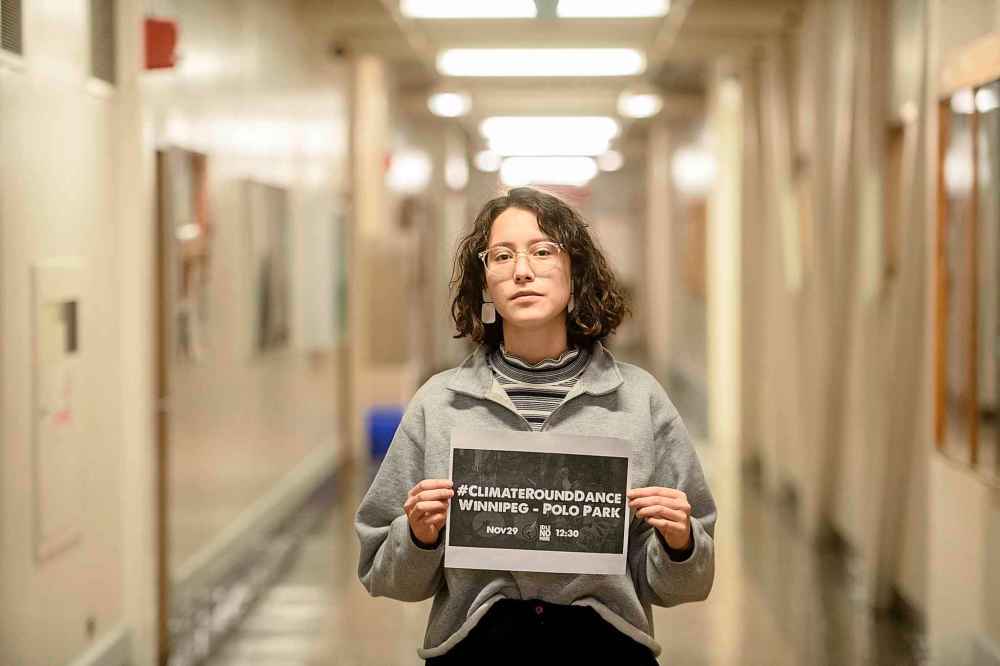Thinking green on Black Friday
Activists take stand against fast fashion
Advertisement
Read this article for free:
or
Already have an account? Log in here »
To continue reading, please subscribe:
Monthly Digital Subscription
$0 for the first 4 weeks*
- Enjoy unlimited reading on winnipegfreepress.com
- Read the E-Edition, our digital replica newspaper
- Access News Break, our award-winning app
- Play interactive puzzles
*No charge for 4 weeks then price increases to the regular rate of $19.95 plus GST every four weeks. Offer available to new and qualified returning subscribers only. Cancel any time.
Monthly Digital Subscription
$4.99/week*
- Enjoy unlimited reading on winnipegfreepress.com
- Read the E-Edition, our digital replica newspaper
- Access News Break, our award-winning app
- Play interactive puzzles
*Billed as $19.95 plus GST every four weeks. Cancel any time.
To continue reading, please subscribe:
Add Free Press access to your Brandon Sun subscription for only an additional
$1 for the first 4 weeks*
*Your next subscription payment will increase by $1.00 and you will be charged $16.99 plus GST for four weeks. After four weeks, your payment will increase to $23.99 plus GST every four weeks.
Read unlimited articles for free today:
or
Already have an account? Log in here »
Hey there, time traveller!
This article was published 28/11/2019 (2236 days ago), so information in it may no longer be current.
Youth climate activists are heading to the mall today — Black Friday — not to search for sales, but to inform shoppers about the environmental costs of fast fashion that aren’t included on clothing price tags.
Manitoba Youth for Climate Action is moving its weekly school strike from outside the Manitoba legislature to inside Polo Park mall today.
The team of environmentalists is hosting a daylong event, starting at the mall with a rally outside Sport Chek and a round dance led by Idle No More. The “Our Futures Aren’t For Sale” day of action wraps up with a sustainable fashion clothing swap at the University of Winnipeg, where members of the public are invited to bring items of clothing they no longer wear and trade with others.

“Black Friday is where companies want people to consume and we’re somewhat against an excessive amount of consuming. We want to shed more light and make people more aware of the type of consuming they’re doing,” said Dominique Carrière, an organizer with Manitoba Youth for Climate Action.
Carrière said the group will chant and hand out pamphlets that inform people about what fast fashion is — the inexpensive and rapid mass production of clothing that keeps up with the latest trends — and suggest sustainable alternatives.
The pamphlet lists second-hand stores and encourages consumers to wear their clothes as long as possible before donating them to local organizations, such as Main Street Project, Siloam Mission and Centre Flavie-Laurent.
It also spells out facts about how fast fashion leaves a massive footprint, noting that major brands often use toxic chemicals, dyes and synthetic fabrics, which release microplastics when they are washed.
“It takes a lot of resources, depending on what makes up that T-shirt. If it’s cotton, polyester, or whatever’s in there, all of those resources, all of those fibres, those base materials take a lot of time to grow, energy, water,” said Anika Kozlowski, an assistant professor of fashion design who researches ethics and sustainability in fashion at Ryerson University in Toronto.
The Winnipeg-born researcher said the average North American throws out approximately 80 pounds of used clothing every year. “Garments aren’t made to last, they’re made in huge quantities and they end up in landfills eventually. They really, truly are made to be disposable items.”
The fashion industry accounts for more than eight per cent of total global greenhouse gas emissions. Meanwhile, Kozlowski said, garment workers are often underpaid and work in poor conditions.
“Cheapness is not free. Those savings are not without an impact. They impact the environment, they impact the people who made it and when we pay that little for something, we don’t value it the same way,” Kozlowski said.
She applauded the youth environmentalists for their efforts in educating Winnipeggers about overconsumption on one of the busiest shopping days of the year.
“The best thing we can do is just refuse to buy anything,” she said, adding consumers should consider fixing worn items, renting clothing instead of buying new, or purchasing second-hand items.
Joe Curnow, an assistant professor at the University of Manitoba who studies social movements, said the protest is a sign that the environmentalist movement, which has a history of being colonialist and racist, is undergoing major changes. The fact the group has partnered with Idle No More is notable, Curnow said.
“It really sees how capitalism, climate change, colonialism, racism are all deeply interwoven and we can’t address any of those in isolation,” she said.
Curnow suspects Manitoba Youth for Climate Justice will continue to grow the movement in the province and escalate tactics so people in power start taking serious action in response to their demands.
Police estimated between 10,000 to 12,000 people showed up for the group’s global climate strike outside the Manitoba legislature and the march along Broadway on Sept. 27.
maggie.macintosh@freepress.mb.ca
Twitter: @macintoshmaggie

Maggie Macintosh reports on education for the Winnipeg Free Press. Funding for the Free Press education reporter comes from the Government of Canada through the Local Journalism Initiative.
Our newsroom depends on a growing audience of readers to power our journalism. If you are not a paid reader, please consider becoming a subscriber.
Our newsroom depends on its audience of readers to power our journalism. Thank you for your support.
History
Updated on Friday, November 29, 2019 9:21 AM CST: Photo added.










